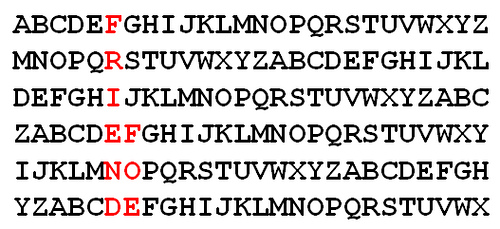Advance the last three letters of FRIEND one position in the alphabet and you get FOE:

Advance the last three letters of FRIEND one position in the alphabet and you get FOE:


ignivomous
adj. vomiting fire

The Ohio Law Journal thus explains how to draw a deed of gift of an orange:–
‘… If a man would, according to law, give to another an orange, instead of saying, “I give you that orange,” which one would think would be what is called in legal phraseology, “an absolute conveyance of all right and title therein,” the phrase would run thus: “I give you all and singular my estate and interest, right, title and claim, and advantage of and in that orange, with all its rind, skin, juice, pulp and pips, and all right and advantage therein, with full power to bite, cut, suck, and otherwise eat the same, or give the same away, as fully and effectually as I, said A.B., am now entitled to bite, cut, suck, or otherwise eat the same orange, or give the same away with or without its rind, juice, pulp and pips, anything heretofore or hereafter, or in other deed or deeds, instrument or instruments, of what nature or kind soever, to the contrary in any wise notwithstanding.”‘
— Journal of Jurisprudence, April 1885
galericulate
adj. covered by a hat
See whelve.

In reviewing a Royal Shakespeare Company production of A Midsummer Night’s Dream for the New York Times in 1970, Clive Barnes found “David Waller’s virile bottom particularly splendid.”
He’d intended to capitalize “bottom.”
In 1915, Woodrow Wilson escorted his fiancee, Edith Galt, to the theater. The Washington Post reported that he “spent most of his time entering Mrs. Galt.”
That should have read entertaining — though presumably she would have been entertained either way.

Although the altitudes are three,
Remarks my daughter Rachel,
One point’ll lie on all of them:
The orthocenter H’ll.
By mathematician Dwight Paine of Messiah College, 1983.
(Further recalcitrant rhymes: month, orange. W.S. Gilbert weighs in.)
nod-crafty
adj. nodding to give an air of wisdom
From a September 1909 Baseball Magazine account of a Giants-Pirates game:
With the third inning faded into the dim and forgotten past, the fourth spasm in the afternoon’s matinee of Dementia Baseballitis hopped into the glare of the calcium glim. It was the Giants’ turn to paddle the pellet, Murderous Michael Donlin taking his turn beside the glad glum. Mike biffed the bulb on the proboscis and sent it gleefully gliding to the distant shrubbery. … Bresnahan managed to get next to the seamy side of a floater and the Toledo kid sent the denizens of Coogan’s Bluff into Seventh Heaven of Gleefullness by starting the pulsating pill on a line for the extreme backyard. But they reckoned without the mighty Wagner. The Carnegie Dutchman extended a monster paw, the near-two bagger was cleverly captured by a dainty dab of his lunch hook and before you could bat an eye he had whipped the globule over to Abby, who made an earnest effort to put Donlin down and out but missed by a fraction of an inch.
Baseball historian Douglas Wallop translates: “In the New York half of the fourth inning, Mike Donlin singled and catcher Roger Bresnahan lined out to Wagner, who almost doubled up Donlin at first base.”
Now how long before the translation becomes incomprehensible?
‘My dearest Maria,’ wrote a recently-married husband to his wife. She wrote back, ‘Dearest, let me correct either your grammar or your morals. You address me, “My dearest Maria.” Am I to suppose you have other dear Marias?’
— The Illinois Farmer, June 1863
When the San Diego Wild Animal Park opened in 1972, it featured a monorail that visitors could ride around the park’s perimeter. The railway was called the Wgasa Bush Line, a suitably exotic name that many visitors assumed was African.
In fact the name arose in a planning meeting. When chief designer Chuck Faust couldn’t think of a name, he wrote WGASA on the plans. “Everybody laughed because they knew what it stood for, but they loved it because it sounded African,” zoo founder Charles Schroeder wrote later. “We thought WGASA would blow over, but it actually stuck.”
It stands for “Who gives a shit anyway?”